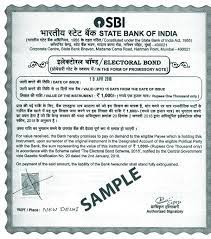
Introduction: Electoral bonds have emerged as a contentious topic in Indian politics, representing a complex system of political funding that has sparked debates regarding transparency, accountability, and democratic integrity. This article delves into the intricacies of electoral bonds, examining their features, challenges, and the legal scrutiny they face.
What are Electoral Bonds? Electoral bonds are interest-free bearer bonds or financial instruments available in denominations ranging from Rs 1,000 to Rs 1 crore. These bonds can be purchased by individuals and companies from authorized branches of the State Bank of India (SBI). One distinctive feature of electoral bonds is their anonymity, as the name and other details of the donor are not recorded on the instrument, making the transactions opaque.
Legal Framework and Amendments: The introduction of electoral bonds was facilitated through amendments to several acts, including the Representation of the People Act, Companies Act, Income Tax Act, and Foreign Contributions Regulation Act. These changes were made via the Finance Acts of 2016 and 2017, paving the way for the implementation of the Electoral Bond Scheme.
Challenges and Legal Scrutiny: Since its inception, the electoral bond scheme has faced significant challenges in the Supreme Court, with arguments questioning its constitutionality and potential threats to democracy. Critics have raised several concerns, including violations of the right to information, possibilities of backdoor lobbying and quid pro quo, and the potential for misuse by shell companies.
Key Arguments Against Electoral Bonds:
- Violation of Right to Information: Critics argue that electoral bonds undermine citizens’ right to know about political party funding, violating fundamental rights enshrined in Article 19(1)(a).
- Potential for Corruption: There are concerns that electoral bonds enable backdoor lobbying and facilitate quid pro quo arrangements between corporations and political parties in power.
- Use of Shell Companies: The removal of donation limits for corporations and Indian subsidiaries of foreign companies has raised fears of shell companies being used to funnel donations.
- Lack of Transparency: Despite claims of anonymity, electoral bonds are seen as opaque instruments that may facilitate corruption and influence peddling without proper oversight.
- Impact on Political Landscape: Critics argue that electoral bonds skew the political playing field, favoring ruling parties and undermining the opposition’s ability to compete fairly.
Future Outlook and Reform Possibilities: The ongoing legal scrutiny of electoral bonds has raised questions about the future of political funding in India. Calls for transparency, accountability, and a level playing field between political parties have intensified, leading to discussions on potential reforms to address the flaws in the current system.
Conclusion: Electoral bonds represent a complex and contentious aspect of Indian politics, with implications for democracy, governance, and transparency. As legal challenges unfold and debates continue, the need for comprehensive reforms to ensure fair and transparent political funding mechanisms becomes increasingly evident. Only through concerted efforts to address the challenges posed by electoral bonds can India safeguard the integrity of its democratic processes and institutions.